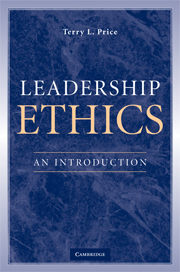2 - Reason and Amoralism
Published online by Cambridge University Press: 05 June 2012
Summary
THE UNIVERSALITY OF REASON
Are leaders above the law? When people in leadership positions are indicted, found guilty, and sentenced to prison, prosecutors and pundits are quick to remind us that the law applies even to leaders: “The jury has spoken and they have sent an unmistakable message to boardrooms across the country that…no matter how rich and powerful you are you have to play by the rules.” Proponents of this particular claim usually have in mind the law of the state. But what about the so-called moral law? Are leaders also bound by the moral rules that apply to the rest of us?
Immanuel Kant (1724–1804), the primary historical exponent of deontological ethics, holds that morality does indeed bind all rational agents, including leaders. According to deontological ethics, what makes an action right or wrong are features of the action itself, not the consequences of the action. So, if Kant is right, leaders cannot justify rule-breaking behavior by appealing to its effects on followers or anyone else for that matter. Reason tells us that some actions simply ought not to be done, and – in this way – it gives us our duties. The leader who nonetheless engages in immoral behavior is being unreasonable. This is true even of the leader who breaks the rules “because she does not care about morality.”
What are our duties on Kant's account? Reason demands that we act only in ways that it would be possible for everyone to act.
- Type
- Chapter
- Information
- Leadership EthicsAn Introduction, pp. 38 - 64Publisher: Cambridge University PressPrint publication year: 2008



